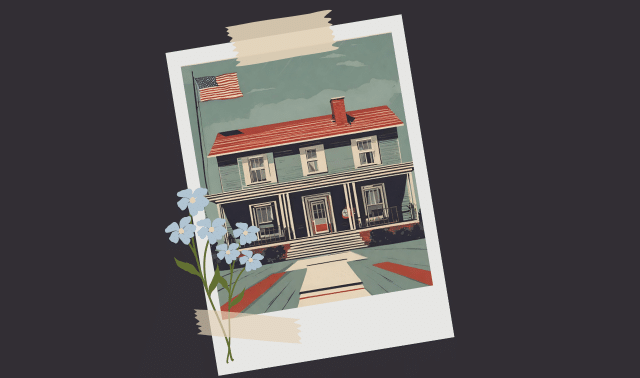After reading your ancestral superstitions in our March 2009 challenge, we’re afraid to cross our eyes, drink bathroom water or let our kidneys get cold, and we stay far, far away from black cats and white roses. But at least our lucky acorns will protect us. The fortunate submitters of these superstitions win our Beginner’s Guide to Genealogy digital download:
Watch out for White Roses My Norse ancestors seemed fixated on death, with superstitions including:
If you hear knocking or a doorbell but no one’s at the door, someone has just died. Grandma said it’s a “dear one” come to say goodbye.
White roses attract the Grim Reaper. My grandmother had an endless supply of stories of groomsmen who begged not to wear white rose boutonnieres, then gave in when laughed at—only to be killed driving home that night.
Opening an umbrella inside or throwing your hat on the bed will cause a death in the family.
Take your Christmas tree and decorations down before midnight New Year’s Eve, or you’ll carry last year’s bad luck into the new year. [Editor’s note: Melody Hefker Gaines of Carrizozo, NM, sent this one, too. In 1929, a leftover Christmas bow caused her ancestors’ house to burn down and the stock market to crash.]
Although I do my best not to pass these traditions on to my grandchildren, I flinch when someone opens an umbrella in the house and secretly wish a safe journey to whomever rang my doorbell.
Julene Watson, Santa Barbara, Calif.
Saved by the Bell
My father was stationed on the island of Corsica in World War II. His unit flew dangerous bomber missions, and most planes never made it back to base. A local woman told my father to get a replica of the Bell of Capri for good luck. On his next no-fly day, he got a small brass bell to put in his buttonhole.
He truly believed it got him home alive, and later, he’d give it to us children when something important was happening. He gave it to me on my first opening night in professional theater, and told me to keep it.
Years later, when Dad was dying in the hospital, I brought him the bell. He said, “I think I never really knew my father,” maybe remembering all those years spent away from home in the war. I wear the bell on a chain and never take it off until someone in my family needs a little good luck.
Amy Murphy-DeMeo, Ormond Beach, Fla.
Funeral Service
My maternal grandmother’s superstition helped me in my genealogical research. Sissy (as we called her) thought it was bad luck for a pregnant woman to go to a funeral.
Sissy and Granddad died long before I got interested in genealogy, so I couldn’t ask them about their parents. My aunt couldn’t recall the year her grandparents died. She did remember that Sissy hadn’t attended her in-laws’ funerals (both died the same year) because she was pregnant. “Who was she pregnant with?” I asked. My uncle, born in 1931. The death certificates were then easy to find.
My aunt could remember only that her maternal grandfather died in the 1940s. After much discussion, she said Sissy told her not go to the funeral because she was pregnant—with her only child born that decade, Jo, in August 1947.
Jane Thursby, Sykesville, Md.
Know When to Fold ’Em
The superstition in our Dickson family was that you’ll always have money if you fold the bills in this manner: Fold in half lengthwise, then fold end to end. It’s worked for me for 82 years. I even have a special billfold sized for them.
Marion Dickson Shires, Zephyrhills, Fla.
On the Cuff
My dad, William Nathaniel Porter, enlisted with the Army Reserves in 1940 and was in the 147th Field Artillery. When he returned home in 1945, the uncle he was named for gave him a pair of Black Hills gold cuff links that had been handed down. Dad married my mom in 1946, wearing those cufflinks. A tradition was started.
I’m the middle of five daughters. Dad walked daughter No. 2 down the aisle wearing those cufflinks, but he passed away before the others married. The oldest son-in-law wore them to give away the other four daughters. Since that time, fathers in our family have worn the cuff links to escort their daughters at their weddings. If a grandson is the groom, he wears them.
So far, they’ve been worn 11 times, and every one of those marriages is still going strong. Mom and Dad were married 24 years. The rest of us? With anniversaries of 36, 35, 34, 27 and 24 years so far, and grandchildren starting their own upward counts, I guess we can say that those cufflinks have been a wonderful good luck charm.
Barbara (Porter) Conner, Midland, Mich.
Bird on a Wire Linda Smetzer of Walnut Creek, Calif., wrote
Family Tree Magazine about an unusual death in her husband’s family tree. “Lovell Rousseau was my husband’s great uncle. My husband had heard a story of Lovell’s wife, Desdemona, being killed by ostriches, and we thought it odd. But we recently found his great-aunt’s death certificate and newspaper articles to corroborate the tale.”
Smetzer says that Nov. 12, 1914, the Rousseaus were traveling by carriage to a wedding in Phoenix. Along the way, they passed the ostrich farm of veterinary surgeon A. J. Chandler, founder of Chandler, Ariz. He’d purchased his first ostriches at the nearby Pan American Ostrich farm and hired wranglers to drive them across the valley. The birds, native to Africa and the Middle East, were valued for their meat and decorative feathers.
Unfortunately, ostriches, which run up to 40 mph, are easily spooked. They stampeded at the wrong moment, and the Rousseaus’ horses bolted. The carriage overturned, throwing Desdemona into the mob of birds. She suffered a broken neck and died. “She’s buried in Phoenix, in the family plot in Greenwood Cemetery,” writes Smetzer.
An ostrich named Rough Neck was somehow singled out for causing the stampede. The “killer ostrich” became a local attraction. But maybe he couldn’t handle the fame: He later strangled himself by wrapping his neck around a fence wire.
Desdemona Rousseau’s story is often retold at Chandler’s annual
Ostrich Festival (the Smetzers haven’t been), featuring ostrich races and ostrich burgers.
Gritty Truth
While researching my own family tree, I teased my friend about her husband’s last name, Cogburn. Was he related to Deputy Marshal Reuben J. “Rooster” Cogburn, portrayed in the movie True Grit by John Wayne?
“Oh, yes,” my friend assured me. “My husband was indeed related to the deputy marshal, but he was really a mean ol’ cuss, and not half as good as depicted in the movie.”
We both lived a few miles from Fort Smith, Ark., where the story took place, so I never doubted her husband’s sincerity. Fascinated, I dug into his claim and found this: Arkansas native Charles Portis wrote the novel True Grit, first published as a serialized story in the Saturday Evening Post in 1868. Good ol’ Rooster Cogburn was actually a combination of several marshals that had served under “hanging judge” Isaac Parker. Poor Vonda—her husband isn’t truly related to the famous deputy marshal, but he’s a great teller of tall tales.
Terry Spear, Crawford, Texas




